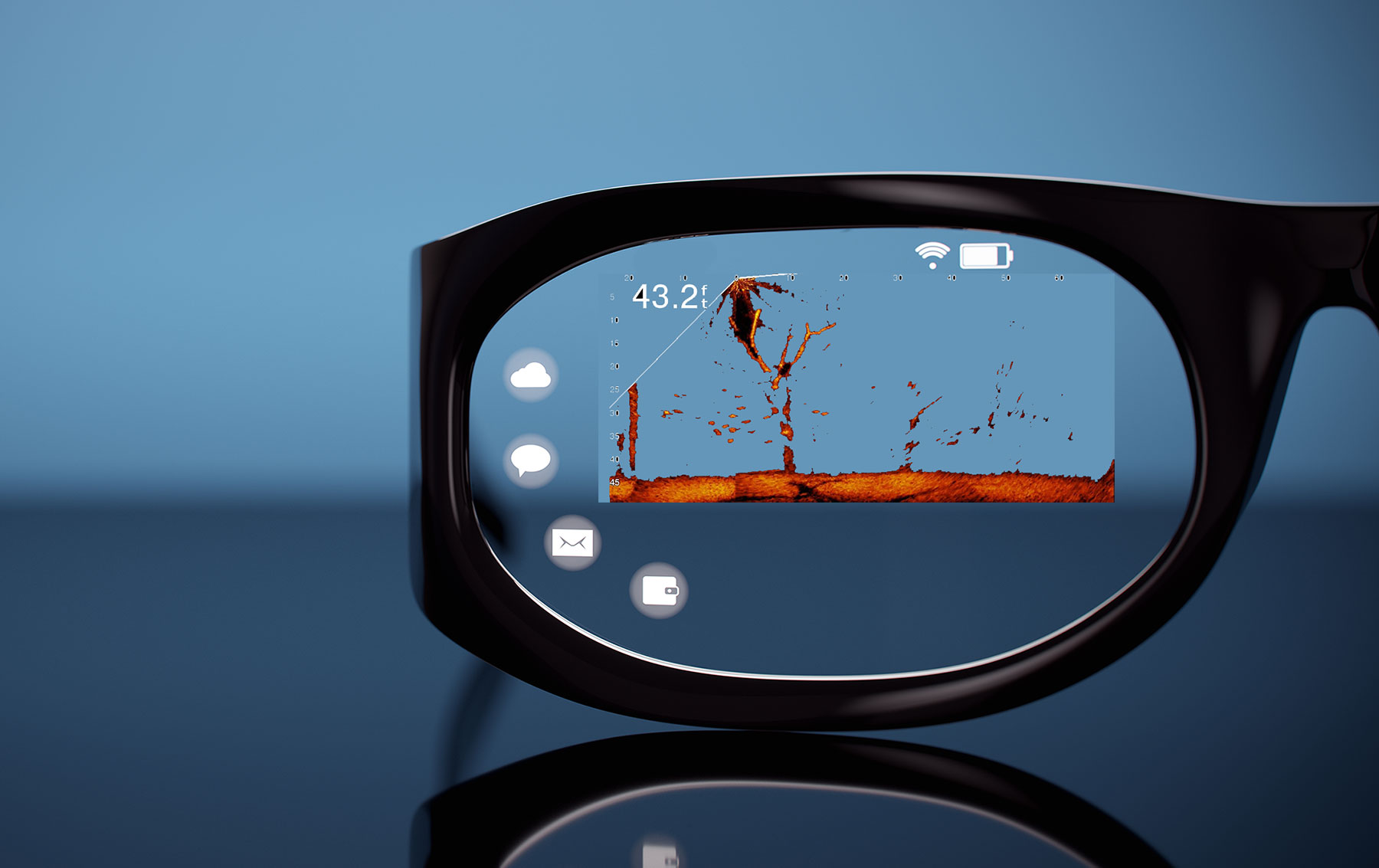We may earn revenue from the products available on this page and participate in affiliate programs. Learn More ›
Ed Loughran, a 53-year-old Bassmaster Elite Series pro, admits he’s not a technology guy.
“I can drive a boat, and I can drive a truck,” he says. “But if the motor breaks, I’m out of luck.”
That’s why he surprised even himself by jumping to the front edge of bass fishing technology. Loughran recently figured out how to link augmented reality glasses with his Garmin LiveScope, essentially getting forward-facing sonar data overlayed on his glasses lens. This means that Loughran doesn’t have to look down at a screen while using LiveScope.
To put this development into context, it’s necessary to understand the landscape in which professional bass fishing finds itself. Advanced electronics have always been controversial, ever since Darrell Lowrance introduced the “Little Green Box” (aka, “Fish Lo-K-Tor”). Still, few have ever fundamentally changed the sport as much as forward-facing sonar has done in less than a decade. Anglers who are well versed in the technology can find fish in front of their boat, single out the biggest ones, and cast right to them.
Read Next: The Unwinnable Battle Over Forward-Facing Sonar
Critics compare the tactic to spotlighting deer. Proponents welcome it as the next evolution in the sport. Loughran is somewhere in the middle, but he recognizes that if he’s going to compete at the sport’s top level these days, he’ll need to embrace the technology. Accordingly, he has the best Garmin units available on his Bass Cat Boat and has spent ample time understanding their capabilities. Unfortunately, while he’s spry and fit for his age, all that time spent looking down at the screen was taking a toll on Loughran’s neck.
“I just wanted something where I could see the screen and didn’t have to have my neck hurt all day,” he says. “After three tournaments up north last year, my neck hurt. Also, my eyes are not as good as they once were. Even with 12-inch screens, I’m not seeing what’s on them as well as my competitors.”
Connecting Augmented Reality Glasses to LiveScope
Over the course of the offseason, he set out to find a way to incorporate the screens into his eyewear. He has a friend who has been the Chief Information Officer and Chief Technology Officer of several publicly traded companies who told him that it couldn’t be done. That motivated Loughran even more.
“I’m as surprised as anyone that it took some 53-year-old dude ordering crap off Amazon who figured it out,” says Loughran, who is also a practicing attorney. “[At first] I didn’t even appreciate the difference between virtual reality versus augmented reality.”
In layman’s terms, the former immerses a viewer completely in a scenario, with no view of what’s going on around them. The latter is what Loughran referred to as “Terminator-looking stuff” — glasses that provide a clear window of the outside environment but also project additional data onto the lenses.
Read Next: The Best Fish Finders
Loughran cobbled together a series of wires with a set of glasses bought on Amazon and shipped from a Chinese factory, which is as far as he was willing to go in describing them (he doesn’t want to give up secrets to competitors). He took the augmented reality rig along to break in his boat. It was a sunny day, and he had trouble getting used to the glasses, but he gave the Frankenstein contraption another chance when he went out shortly thereafter to dial in his electronics. This time, it was a cloudy day.
“They were much easier to use,” he recalls. “I used them for three or four hours, but after five or ten minutes, I knew it was right. It was on. My eyes and my head were working with them. It’s like the equivalent of a 300-inch screen, like sitting in a movie theater.”
Refining the Tech
The glasses that Loughran purchased sight-unseen sit high on his face and don’t block much light. That creates drawbacks, but it also allows him to shift his eyes down to look directly at the trolling motor with an unimpeded view.
Unfortunately, the unit’s off-brand cable HDMI cord eventually burned itself out. Through some research, Loughran determined that Garmin made a cable that formed the basis of a replacement, albeit one requiring multiple adapters to produce both data and power.
“Right now, you’re tethered to your unit by 15 feet of very heavy-duty cable, but I recognize that this is just the Alpha test version,” he says. “There’s no reason on earth that someone couldn’t make a cleaner version on a better pair of wraparound lenses.”
Read Next: Garmin LiveScope Review
Oddly enough, Loughran did not use the glasses during the season-opening Elite Series tournament on Toledo Bend Reservoir, even though most of the top finishers were relying almost exclusively on their forward-facing sonar. That wasn’t because of any ethical concerns or rules, but rather because he was still clinging to a prior paradigm.
“I just wasn’t fishing off the bank enough to justify them,” he says. “And with the ones I built, they’re not ideal when you’re just going down the bank.”
He’ll use the augmented-reality glasses when the appropriate opportunity arises, but not without some mixed feelings.
“I don’t know if this is taking us to a good place, but it’s going to happen,” he says.
Loughran finished 92nd with a total weight of 23 pounds, 1 ounce. Kyoya Fujita won the tournament with a total weight of 100 pounds, 13 ounces — all caught while scoping.
Read the full article here




